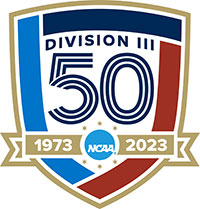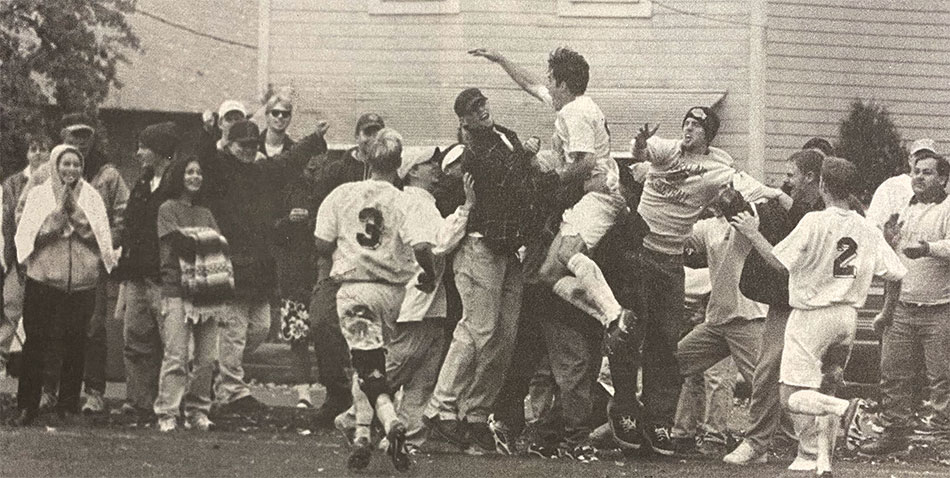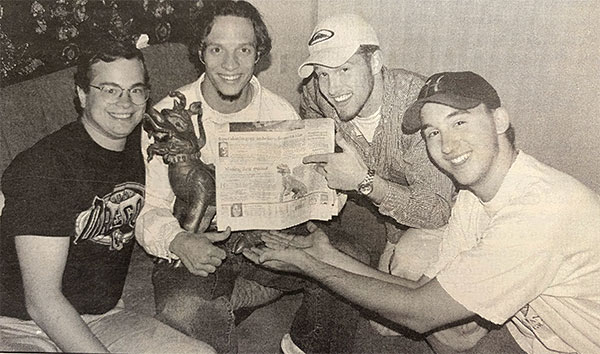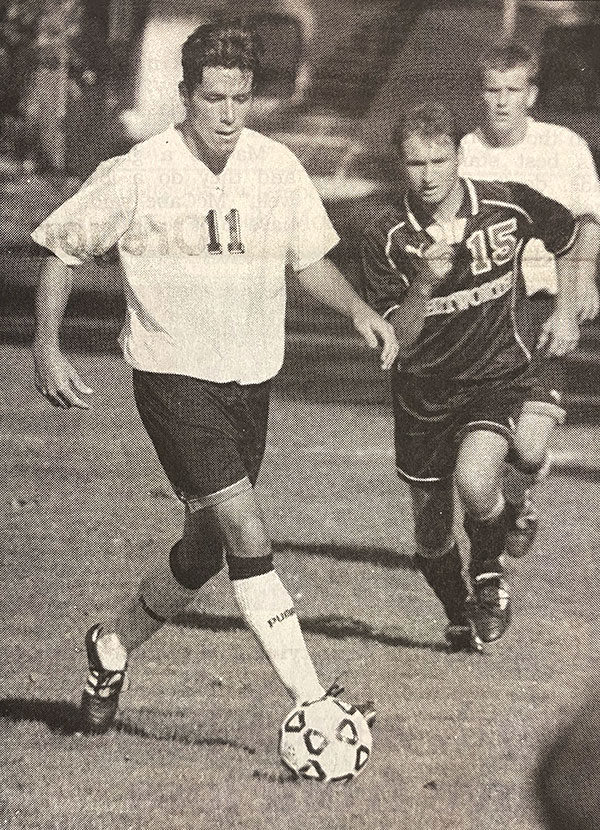How The West Was Won: The 1998 Pacific Men's Soccer Team - Part 3
 In 2023-24, NCAA Division III celebrates its 50th anniversary while Pacific University and other Northwest Conference institutions celebrate 25 years as full Division III members. As part of that celebration, we are chronicling the story of Pacific’s 1998 men’s soccer team, the first Boxer team to qualify for the NCAA postseason.
In 2023-24, NCAA Division III celebrates its 50th anniversary while Pacific University and other Northwest Conference institutions celebrate 25 years as full Division III members. As part of that celebration, we are chronicling the story of Pacific’s 1998 men’s soccer team, the first Boxer team to qualify for the NCAA postseason.
The third and final part of this series remembers Pacific's selection to the NCAA postseason and the team's two matches in the West Regional Championship at Tom Reynolds Field.
1998 Pacific Men's Soccer Final Statistics | West Regional Championships Program | Season Wrapup From Pacific Magazine
Part 1: Welcome To The Association
Part 2: Great Expectations
Part 3: A Party At Tom Reynolds Field
 The numbers worked in Pacific’s favor but would it be enough?
The numbers worked in Pacific’s favor but would it be enough?
The Boxers finished the 1998 menʻs soccer regular season in second place in the Northwest Conference at 12-4-0 and 36 points, one point behind conference champion Seattle University. But Seattle was not yet eligible for NCAA postseason play, leaving Pacific as the top team from the conference.
Pacific scored 31 goals during the regular season, 25 of which had been scored against conference opponents. Since September 20, the Boxers had allowed just 10 goals, with only Seattle U. and George Fox scoring against Pacific more than once. The defense and freshman goalkeeper Ryan Stanley ʻ02 posted seven shutouts on the season, tying with Seattle U. for the most in the NWC.
Still, head coach Jeff Enquist ʻ98 wondered if those credentials would be enough for the Division III newcomers to earn their spot in the postseason. He hoped that winning would make the difference. The Boxers closed the regular season with seven straight wins and lost just once in the month of October (to Seattle U.).
“We knew that if we wanted to get into the NCAA tournament, we had to earn respect and it was going to be by winning,” Enquist said. “We had to win games. We had to put results on the board and we did that at some really crucial times.”
The Boxers would have to wait a week after their Nov. 1 season finale win over Evergreen State to learn their postseason fate. To keep the turf at Tom Reynolds Field in playable condition, that meant a week of wet evening practices under loud portable lights at the nearby Cannery Field for matches that may or may not happen against unknown opponents.
On Sunday, Nov. 8, the team gathered in the classroom in the Pacific Athletic Center (now the Stoller Center) for a conference call announcing the championship field. The team was stunned. There would be no travel to Southern California or the Midwest.
Not only had Pacific earned a playoff spot, but earned a first-round bye and hosting rights for the Division III West Regional. The postseason was coming to Forest Grove.
“We had a good feeling that we were going to get in, but we certainly didn’t know that we were going to host,” Chris Burke ʻ00 said. “When the announcement came, we were all so stoked. We were so excited.”
“We were all sitting there asking ‘Are we going to make it? Are we going to get in?’” Hoang said. “That was a defining moment. We not only made it but we got the home field. The stage was set for us. Now it’s our job to keep working hard and getting results.”
At the time, Enquist was shocked. “We had no idea that we’d even get in,” he said in a press release. “I just about fell backwards in my chair. We were worried about not getting respect and I think they did just the opposite by showing us and this conference a lot of respect.”
Looking back 25 years later, Enquist remembers more of a matter-of-fact approach to the announcement. “I think we went straight out to the field to train,” he recalled. “It was like, ‘Okay, now we know.’”
Along with the postseason selection came some of the national respect that the Boxers had been working towards all season. The Boxers entered the playoffs ranked No. 17 in the National Soccer Coaches Association of America (NSCAA) Division III National Rankings and the No. 2 position in the West Region Rankings.
It would be another three days before Pacific learned that it would face Chapman, who advanced with a 2-1 road win at Cal Lutheran. Macalester needed double overtime to secure its trip to Forest Grove, scoring once in each of the extra periods to beat Luther 3-1 to earn a second-round meeting against St. Olaf.
It took a while for it to sink in that the postseason was coming to Forest Grove. “I didn’t really believe it until we started hanging NCAA banners around campus. We had them all over,” Enquist said. “It was an amazing time. It was almost like floating on cloud nine.”
The Naked Soccer Fan Club
 Pacific would host the West Regional in front of the best home match atmospheres in the West, thanks in part to one person who never made the team.
Pacific would host the West Regional in front of the best home match atmospheres in the West, thanks in part to one person who never made the team.
Zephyr Sincerny ’98 tried out for the Boxers as a freshman but failed to make the team. Rather than remaining bitter over being cut, he channeled his emotion into creating a fan club modeled after supporter’s groups that followed European teams.
Known as the Naked Soccer Fan Club, Enquist said the group foreshadowed the supporter’s group that became the Timbers Army when the Portland Timbers was resurrected as an A-League professional side in 2001. The two sets of bleachers at Tom Reynolds Field barely held all of the students who came out match after match.
At the time, Pacific did not have a football team and soccer was the main athletic focus in the fall. The Naked Soccer Fan Club made matches into events.
“It was amazing what Zephyr did, the support he got and the amount of people that got behind it,” Enquist said. “Everyone looked forward to it. Home games were circled on people’s calendars. You wanted to play in front of those crowds.”
With the tight-knit atmosphere of the Pacific campus, it was more than just fans supporting the colors. “Those were our friends,” Rusty Sandusky ʻ99 said. “To have a group of friends and a crowd like that showed up and supported you and were into it, that just motivated us to play hard.”
“I was like, ‘Oh wow, there are a lot of people here. This is a really cool atmosphere to be part of,’” Ryan Stanley ʻ02 said of his first impressions as a freshman. “In Hawaii, we played in a big football stadium. You heard the echoes. At Pacific, the experience was very intimate. You could hear all of the fans chanting.”
The chants were never more apparent when a goalkeeper made a save. During his hall of fame career, Nick Vorberg ’97 had his each save greeted by 300 fans yelling “Nick is god!”
So if Nick Vorberg was god, who was the newcomer?
“I remember a couple of the guys asking me, ‘Nick’s chant was “Nick was god.” We tried that on for you and it just didn’t seem right,’” Stanley recalled. “Then they said, ‘Well, what is we used Ryan is Zeus? He was the god of gods.’
“I was an 18-year-old kid. You’re gonna chant my name? I don’t care!”
Of all of the Naked Soccer Fan Club’s antics, none was more memorable than the goal chair, a ratty upholstered loveseat that had made Goodwill buys look like Ethan Allen antiques. It was wet, moldy, spray painted and smelled every bit of its neglect. And it became a throne every time a Boxer scored.
“Whenever you scored a goal, you went and jumped in that chair near the stands,” said Burke, who assumed the goal chair four times that season. “Those unique things were super fun.
“Once we started to have success, particularly later in the season and into the playoffs, we became the talk of campus. Most of the school bought into it.”
For as much as the NCAA postseason was a reward for the team, it was also a reward for its supporters. And the Boxers would need every ounce of their fandom for the playoff run.
Let's Dance
 It was a mild day for the four semifinal teams in the NCAA West Regional on November 14, 1998. Temperatures topped out at 58 degrees and a light rain would hold off until after the afternoon matches.
It was a mild day for the four semifinal teams in the NCAA West Regional on November 14, 1998. Temperatures topped out at 58 degrees and a light rain would hold off until after the afternoon matches.
But Tom Reynolds Field was notorious for quickly becoming a mud pit as the late October rains moved into the Willamette Valley. And while the Boxers had stayed off their home pitch for two weeks, the conditions came into play quickly.
Soccer is a game won and lost by single mistakes and it took just one mistake for No. 23-ranked Macalester to advance in the opening match. An own goal by St. Olaf in the 22nd minute was the only ball to find the net as the Scots won 1-0. St. Olaf had outshot Macalester 10-6 and held a 5-1 edge in corner kicks, but the errant ball ended the No. 5-ranked Lions’ season.
Emotions were high when Pacific kicked off against Chapman in the second semifinal. The stands were packed and loud. The energy was electric. Enquist’s challenge was to keep those emotions from running too high.
Pacific struck first. Jeff Mazurek fed a ball from the midfield to Sandusky, who found Burke for his seventh goal of the season in the 15th minute. Nearly 20 minutes later, Chapman tied it on a set piece when Brad Carter buried Mike Sterner’s corner kick in the 34th minute. The match was tied 1-1 at half.
“They came right back and equalized it, and rightfully so. They were a good team,” Enquist said. “When that ball went in, I wondered if we were on too high of a high. Would we be able to hold out and get through it?”
In the 80th minute, it was Sandusky getting it done for the Boxers again in the most unconventional way. Stanley’s long punt from goal landed at the feet of Burke at midfield. He flicked the pass to Sandusky. The goal in the 80th minute was his sixth game-winner of the season and earned Stanley a rare assist from the goalkeeper position.
“(Chris) headed it down,” Sandusky said. “I was able to bring it down off of my chest. I went through a couple of players and was able to put the ball in the back of the net.”
Burke doesn’t remember the goal or the game-winning play, but he remembers the emotions well. “I had struggled in my first two or three years,” he recalled. “When Jeff moved me up front, it was a bit of a relief, which allowed me to play a bit more freely and more aggressively.”
At the time, Sandusky did not think much of his performance, telling Pacific sports information director Steve Fox that it was his worst game of the year. Despite the hard self-evaluation, he was also as confident as ever in his team. “Tomorrow is going to be fun. We’re going to be a completely different team. I feel we can beat anyone if we play our game.”
Enquist was cautiously optimistic. “It was an unbelievable moment knowing we had advanced. Not only did we get to host, but we got to advance. Playing Macalester next, that was an iconic Division III team at the time. We were excited to play them.”
With as hard as the Boxers fought to beat Chapman, it would take an equally robust effort against Macalester to claim the regional title.
At the outset, the aggressive nature of the match played to the Boxers’ favor. Twenty minutes into the match, Pacific went a man up when all-region forward Larry Griffin was shown a red card. Despite the man advantage, Macalester controlled the pace of the match in the first half. Stanley, the freshman, played like an upperclassman as the first half closed with a 0-0 deadlock.
Pacific flipped the script offensively in the second half, pushing aggressively against Scots’ goalkeeper Andrej Slapar. But however the offense bent, Slapar would not break.
“There were plenty of balls that beat the keeper,” Enquist said. “I clearly remember Chris Burke heading the ball past the keeper, only to have another kid clear it off the line. We also hit the post a couple of times in that flurry.”
Pacific had only two corner kicks on the day. Sandusky remembers one of them vividly. “Brad Day put it right on the spot. I got my head on it, it bounced down, hit a spot on the field and then it bounced straight up over the goal.”
The deadlock broke in the 85th minute with Tom Reynolds Field infamously muddy eastern end playing a role. The Scots played a ball into the penalty area off of a set piece, where Stanley was set for the save on the initial shot. Armin Heuberger, a 1998 All-American, was in place for the rebound for a 1-0 Macalester lead. The pressure was on.
“The last four or five minutes we threw everything forward,” Burke said. “We were lobbing balls in. I was trying to come up with headers and just nothing came through.”
Five minutes later, Macalester celebrated its school-record 18th victory. The Boxers were left stunned on their home field. The season was over.
“It was a massive letdown,” Burke said. “It was a tight game all the way. We had our chances. It was wet and slippery but it was the same for them.”
“We couldn’t get a ball in the back of the net,” Sandusky said. “I felt like we were pounding on them the entire game. They got the breakaway at the end and, all of a sudden, the game is over and we lost.”
All of these years later, Enquist chalked the loss up to the breaks of the game. “It was just one of those weird games,” he said. “We fully deserved, in my opinion, to win that day. Their coach said the same thing. It’s just the way that soccer could really cruel sometimes.”
At the time, Macalester head coach Roger Bridge agreed. “Pacific came out extremely hard and we had to weather that. It was the kind of game fans like to watch with action end to end.”
As quickly as it all came together, the 1998 season faded away and with it an era of incredible success in Pacific men’s soccer history. After the 1999 season, Enquist left Pacific to focus primarily as director of the Portland City United soccer club, which he continues to operate. The Boxers wouldn’t return to the postseason until 2010, when Jim Brazeau ’89 led the team to its first NWC championship since 1996.
“It’s weird just how quick and final it was,” Enquist said. “You’re done. It’s over, the banners came down and everyone moved on. There wasn’t a lot of time to really celebrate and enjoy what the team accomplished.”
The sudden end still impacts Sandusky, whose 14 goals in 1998 remain the second-most in program history.
“It was definitely a hard pill to swallow because we should have won that game. At the end of the day, we should have won. But all of a sudden, it’s over. That was the last time I stepped on a collegiate soccer field for Pacific.”
In the Pacific record books, the 1998 team is still well-represented. The team’s 15 wins remain the second most in program history. Sandusky’s 75 shots and six game-winning goals continue to be season records. The team’s seven wins away from Forest Grove is also a program record. The Boxersʻ final ranking of No. 14 in the NSCAA Division III poll was the best until the 2010 NWC championship team rose to No. 11.
Twenty-five years later, members of the team know that being part of that particular era in the history of Pacific athletics was something special.
“We all wanted the same things. We all just cared and it became a really good atmosphere here,” Enquist said. “The kids loved putting on the Pacific University jersey. When you get to the point where you are proud to put on the jersey of who you are representing, that’s special.”
“I was lucky to go to Pacific,” Stanley said. “I’m very lucky to have a degree from there, very lucky that I got to play college sports at Pacific at a relatively high level within Division III. I don’t know if I could eloquently put how deeply grateful I am for that university, for giving me the opportunity.”
“I wouldn’t have graduated from Pacific if it wasn’t for soccer,” Sandusky said. “The sport got me to where I am today. The work on the field and the drive to want to play is what made me keep going. I’m very grateful for Pacific. It got me to where I am.”


